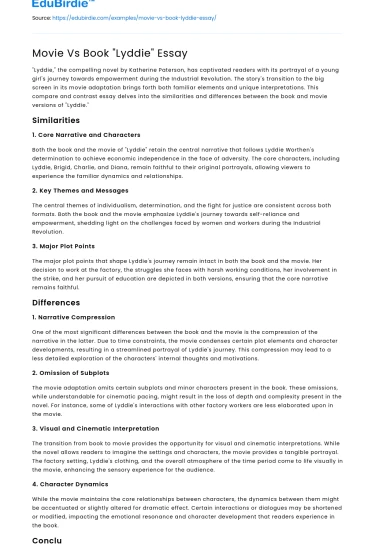"Lyddie," the compelling novel by Katherine Paterson, has captivated readers with its portrayal of a young girl's journey towards empowerment during the Industrial Revolution. The story's transition to the big screen in its movie adaptation brings forth both familiar elements and unique interpretations. This compare and contrast essay delves into the similarities and differences between the book and movie versions of "Lyddie."
Similarities
1. Core Narrative and Characters
Both the book and the movie of "Lyddie" retain the central narrative that follows Lyddie Worthen's determination to achieve economic independence in the face of adversity. The core characters, including Lyddie, Brigid, Charlie, and Diana, remain faithful to their original portrayals, allowing viewers to experience the familiar dynamics and relationships.
Save your time!
We can take care of your essay
- Proper editing and formatting
- Free revision, title page, and bibliography
- Flexible prices and money-back guarantee
2. Key Themes and Messages
The central themes of individualism, determination, and the fight for justice are consistent across both formats. Both the book and the movie emphasize Lyddie's journey towards self-reliance and empowerment, shedding light on the challenges faced by women and workers during the Industrial Revolution.
3. Major Plot Points
The major plot points that shape Lyddie's journey remain intact in both the book and the movie. Her decision to work at the factory, the struggles she faces with harsh working conditions, her involvement in the strike, and her pursuit of education are depicted in both versions, ensuring that the core narrative remains faithful.
Differences
1. Narrative Compression
One of the most significant differences between the book and the movie is the compression of the narrative in the latter. Due to time constraints, the movie condenses certain plot elements and character developments, resulting in a streamlined portrayal of Lyddie's journey. This compression may lead to a less detailed exploration of the characters' internal thoughts and motivations.
2. Omission of Subplots
The movie adaptation omits certain subplots and minor characters present in the book. These omissions, while understandable for cinematic pacing, might result in the loss of depth and complexity present in the novel. For instance, some of Lyddie's interactions with other factory workers are less elaborated upon in the movie.
3. Visual and Cinematic Interpretation
The transition from book to movie provides the opportunity for visual and cinematic interpretations. While the novel allows readers to imagine the settings and characters, the movie provides a tangible portrayal. The factory setting, Lyddie's clothing, and the overall atmosphere of the time period come to life visually in the movie, enhancing the sensory experience for the audience.
4. Character Dynamics
While the movie maintains the core relationships between characters, the dynamics between them might be accentuated or slightly altered for dramatic effect. Certain interactions or dialogues may be shortened or modified, impacting the emotional resonance and character development that readers experience in the book.
Conclusion
The transition from book to movie presents "Lyddie" with both common threads and nuanced differences. While the core narrative and themes remain constant, the movie's narrative compression, omission of subplots, and visual interpretation create a distinct viewing experience. Readers of the book might appreciate the depth of character exploration and internal reflections, whereas the movie offers a visual representation that brings the world and characters to life.
Ultimately, whether one engages with "Lyddie" in its original literary form or its cinematic adaptation, the story's enduring themes of resilience, empowerment, and the pursuit of dreams continue to resonate. The exploration of both versions allows for a richer understanding of the narrative's evolution and its enduring impact on audiences, offering a multifaceted experience that captures the essence of Lyddie's journey.






 Stuck on your essay?
Stuck on your essay?

